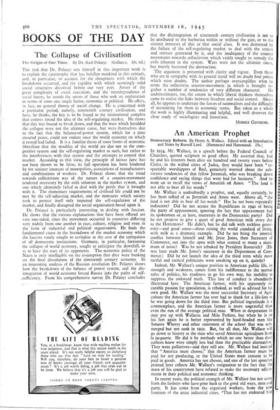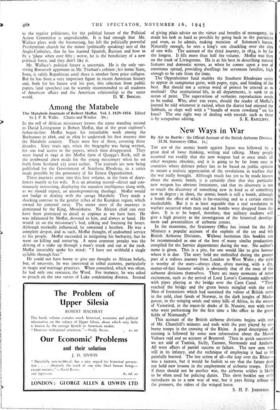An American Prophet
Democracy Reborn. By Henry A. Wallace. Edited with an Introduction and Notes by Russell Lord. (Hammond and Hammond. 15s.)
IN 1934, Mr. Wallace, in a speech before the Federal Council of Churches, quoted scripture to good effect. He asserted that, had he and his listeners been alive six hundred and twenty years before Christ, in the walled cities of Judea, they would have been "re- spectable worshippers of Baal, genuinely worried about the sub- versive tendencies of that fellow Jeremiah, who was breaking down confidence and saying things that were bad for business." And he went on to recall the views of Amaziah oil Amos. "The land is not able to bear all his words."
Mr. Wallace is undoubtedly a prophet, and, equally certainly, he has been talked of as Jeremiah and Amos were. Above all, "the land is not able to bear all his words." Has he not been repeatedly indiscreet? Did he not accuse the Republicans in 1940 of being the party of appeasement, ignoring the fact that appeasement had its spokesmen or, at least, mutterers in the Democratic party? Did he not propose to give a quart of good American milk every day to the Hottentots? He didn't, but he did talk with reckless gener- osity—and good sense—about raising the world standard, of living, with milk as a dramatic example. Did he not bring the internal conflict between himself and Mr. Jesse Jones, then Secretary of Commerce, out into the open with what seemed to many a maxi- mum of noise? Was he not rebuked by President Roosevelt? (He was later made Mr. Jones's successor in the Department of Com- merce.) Did he not launch the idea of the third term while more tactful and tactical politicians were sneaking up on it, quietly?
Indeed, Mr. Wallace's unique position in American public life, its strength and weakness, comes from his indifference to the normal rules of politics, his readiness to go his own way, his inability to suppress the awkward- truth. This line of conduct is abundantly illustrated here. The American farmer, with his apparently in- curable passion for speculation, is rebuked, as well as advised for his own good. Mr. Wallace was the most successful Secretary of Agri- culture the American farmer has ever had to thank for a life-line as he was going down for the third time. But political ingratitude is a commonplace, and the American farmer is more ungrateful than even the run of the average political man. When in desperation he may put up with Wallaces and Milo Perkins, but when he is on his feet again he is better represented by hard-headed men like Senator Wherry and other statesmen of the school that was sub- merged but not sunk in 1932. But, for all that, Mr. Wallace will go down to history as the man who saved American agriculture from in jacquerie. He did it by methods which no one better than their authors knew were simply less bad than the practicable alternatives. They were palliatives—and they still are. Mr. Wallace had insisted that "America must choose," that the American farmer must be paid for not producing, or the United States must consent to be paid in goods. America has not chosen, and one of the last speeches printed here reflects Mr. Wallace's resignation to the fact that the mass of his countrymen have refused to make the necessary adjust- ments in their political and economic thinking.
In recent years, the political strength-of Mr. Wallace has not come from the farmers who have gone back to the good old ways, men and party. It has come from the organised workers, from the new frontiers of the great industrial cities. That has not endeared him
to the regular politicians, for the political future of the Political Action Committee is unpredictable. It is bad enough that Mr. Wallace plays with the boomerang, has left the politically powerful Presbyterian church for the minor (politically speaking) sect of the Anglo-Catholics, that he has learned Spanish, Russian and how to fly a 'plane when over fifty ; worse, be is the beneficiary of a new political force, and they don't like it.
Mr. Wallace's political future is uncertain. He is the only sur- viving Roosevelt appointee in Mr. Truman's cabinet ; his home State, Iowa, is safely Republican until there is another farm price collapse. But he has been a very important figure in recent American history and, both for his future arid his past, this selection from public papers (and speeches) can be warmly recommended to all students of American affairs and the American relationship to the outer































 Previous page
Previous page